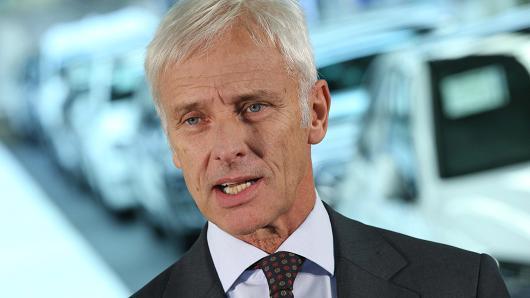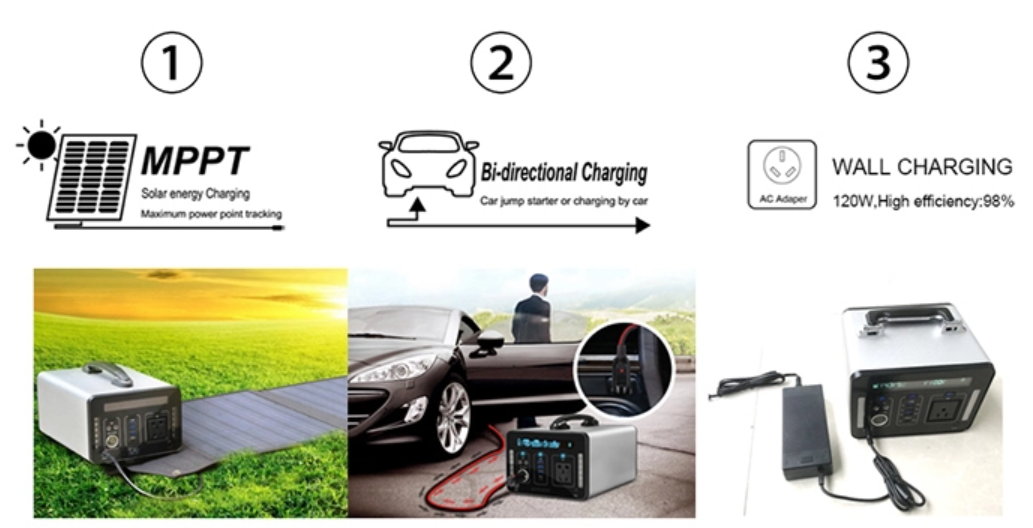Photo: On October 21, 2015, in Wolfsburg, Germany, Matthias Mueller, Chairman of the Volkswagen Group, and Bernd Osterloh, Chairman of Volkswagen's Working Committee, and Stephan Weil, Governor of Lower Saxa State, speaks to the media before the production line of the Volkswagen Factory On September 12, CNBC reported that according to CNBC, Volkswagen Group is gradually turning to electric vehicle manufacturers and plans to invest USD 24 billion to develop zero-emission vehicles by 2030 to challenge the mass market created by Tesla. The world’s largest-selling car manufacturer today said that by 2025, the company will launch 80 new electric vehicles among its brands, far beyond the previous 30 models, and hopes to launch 300 electric models by 2030. The German company had previously stated that by 2025, it will invest more than 12 billion U.S. dollars in research and development of electric vehicles. Until two years ago, Volkswagen acknowledged that cheating on diesel emission tests sold in the United States led to slower progress in the development of its electric vehicles and unmanned technologies, but the “Diesel Door†scandal also prompted a strategic shift for the general public. After the automotive scandal erupted, major advances in the field of batteries and the strengthening of the global anti-pollution trend have imposed tremendous pressure on automakers and demanded that they accelerate the development of zero-emission alternatives. Matthias Mueller, chairman of the Volkswagen Group, told reporters on the eve of the start of the Frankfurt car: "Companies like the Volkswagen must be in a leading position, not chasing it behind." He also announced the public's "electric "The road map for the car", and said: "We are setting the scene for the final breakthrough of the motor dynamics." Volkswagen's so-called ID models will compete with Tesla's cheapest Model 3 models ($ 35,000). In addition to Volkswagen, other German car manufacturers have also announced their plans for electric vehicles. Daimler claims that its Mercedes-Benz luxury brand plans to electrify all models before 2022, but the company warned that the transition to low-margin electric vehicles requires additional cost savings. BMW introduced the i3 electric car in 2013. The company recently announced that it is preparing to mass-produce electric vehicles by 2020, and promised to launch 12 pure battery-powered models by 2025. Restrictions and charges on diesel and gasoline vehicles are driving the rise of electric vehicles, but analysts say large-scale investments in charging stations and the power grid need to serve the mass market. As the world's largest auto market, China is studying when to stop production and sales of fuel vehicles, which echoes the actions of Britain and France. Britain and France have announced that they will ban the use of traditional cars from 2040 onwards. In order to meet the needs of the “Electric Vehicle Roadmapâ€, Volkswagen has begun the process of selecting partners in China, Europe and North America to provide batteries worth more than US$60 billion and related technologies. In January of this year, Tesla started large-scale production of lithium-ion batteries at its super factory in Nevada. The company's goal is to achieve an annual battery production capacity of 35 billion watt-hours. Volkswagen said it will need at least four super factory capacity to meet the demand for a significant increase in electric vehicles. In an interview with Reuters Television, Mill said that the public does not need to sell assets to raise funds for the electric vehicle program. He said: “Although we have suffered financial losses due to the diesel door incident in the past two years, we have no problems with these investments.†Volkswagen’s electric vehicle program will develop a new MEB module with its eponymous brand. The platform is centered, and the platform will lay the foundation for all of the group's mass-market electric vehicles. Volkswagen's golf-style compact model is expected to be launched in 2020 with a range of about 600 kilometers. (small)
Solar generator refers to equipment that can use sunlight to charge batteries. It is convenient to carry with a compact size and lightweight, and can supply power to portable devices such as mobile phones, tablets, laptops, mini fans, etc. No matter you are at home or outdoors, this UFO power station can be recharged in 3 ways, including AC Wall outlets charging, solar charging and car charging, which can be freely switched depending on where you are and help you solve the problem of charging inconvenience.
This UFO lithium portable power station will allow you to enjoy a better outdoor time or deal with emergency situations. One of the best features is the fan-free design. Without noisy motors or noxious exhaust fumes, this portable power station is clean for use and provides a no noise and peaceful environment in the quiet dark night for users.
Mobility, portability, versatility are three main advantages of portable power station.
- Mobility refers to the on-the-go power solution wherever you are. Users can recharge their digital appliances anywhere, such as in a forest adventure, on the top of mountains, or even in a basement.
- Portability means the compact size and light weight of this power station. The UFO solar generators are equipped with lithium batteries, which can provide a safe and perfect battery performance with a longer service life. UFO POWER offers 500Wh and 1000Wh Portable Power Station to cater to your specific needs for power supply.
3.Solar Panel Charging
-- Storm
-- Power Failure
-- Emergency
-- CPAP
-- Fishing
-- Camping
Portable solar generator, Portable Power Station,Portable Power Supply,Backup Battery For Camping ShenZhen UFO Power Technology Co., Ltd. , https://www.ufobattery.com
Why Use Battery-powered Generator?

Multi-Function Power Supply Device
It is a safe, clean and reliable power source which is mighty enough to charge various mobile devices, laptops, and it can even power the most demanding electrical appliances.
The UFO portable power station is a range of rechargeable lithium batteries providing several ways of power supply, including
·AC Power Socket
·12V DC Port
·USB Port
·Type-C Port
·Car Jump Starter
Three ways to charge the solar generator
1.AC Wall Outlet
2.Car Charging

Wide Application

Long Service Time for Electronic Gear
